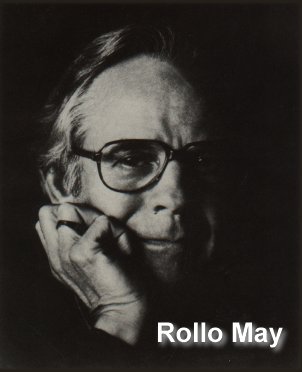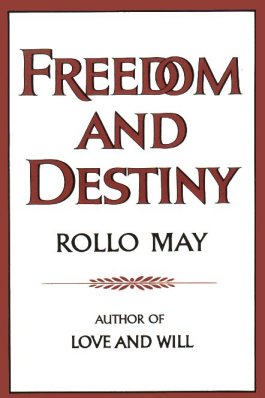Introduce Rollo May

INTRODUCE ROLLO MAY
Rollo May is the best known American existential psychologist, or the "father of existential psychology". He's born in April 21, 1909. His family has several problems, including how his parents can't get along which each other and divorced, and his sister suffers from mental breakdown.
He enters Oberlin College in Ohio and receives the bachelor degree in the year 1930. Then he began his job as an English teacher in an American University in Greece. During his job as a teacher, May frequently went to Vienna to attend Alfred Adler's seminars, and he got called back to study theology in USA. He receive a bachelor of divinity degree in 1938. After a while, he resigned from the ministry and began his study in psychology at Columbia University.
While studying, though, he became sick from tuberculosis, which is a deadly disease. Because of the experience of having such a life-threatening illness, he becomes fonded with existential psychology, due to his belief that the struggle to live and get well is more important in term of determining his fate for life than any medical treatment. His background in theology becomes a main impulse for him to study the field of psychology informed by existentialist philosophy.
In 1949, May completes his doctorate in psychology. The first book he published, Existence (1958) is the book that plays a major role in the emerge of American humanistic psychology. It contains the accumulation of translated works from many other existential-phenomenological psychologist. It also includes May's own essays on the field, portraying his enriched understanding on the importance of existential psychology.
May died on October 22, 1994, in California, USA.
What are some of his works?
May was very interested in reconciling the Humanist Perspective with other approaches, such as the Psychodynamic Perspective. His uses of words are different from other psychology; he uses the word "destiny" as to explain that part of our lives are predetermined for the purpose of creating life, and "courage" as for the authenticity of facing and overcoming the anxiety.
He saw life as divided into 5 stages:
- Innocent: preconscious stage; dominant in infant; ones do thing according to only what they must do in order to survive, though does have some degree of will in the sense of fulfilling needs
- Rebellion: want of freedom without full understanding of the responsibility lies within that freedom
- Decision: transition stage; broke away from parent; must decided which path they want to take in life to obtain the wants from the rebellion stage
- Ordinary: normal adults; learn of responsibility but found it too demanding
- Creative: existential stage beyond ego and self-actualization; accept destiny and face anxiety with courage
Another one of May's theories deals with the motivation, called as the daimonic (Greek: little God). He basically explains that the daimonic is composed of many specific motives, called daimons, and each individual has different set of daimonic. Daimons includes the lower needs, such as food and wants to reproduce, as much as the higher needs, such as love.
One of the major daimon is Eros, or love. May saw love as the need a person has to becomes "one" with another person, referring to the ancient Greek myth.
May stated that having daimon is usual and okay, but over a period of time, those daimons, even the Eros, can take over a person. That is, a person can become obsessed with these motivations. May refers to this situation as daimonic possession.
May also focused on "will". He defined will into two ways. One is that it is "an ability to organize oneself in order to achieve a certain goal", making it to be very similar to the ego. May also hinted that will is also a daimon. Another meaning of will is "an ability to fulfill one's wish. " Wish, in this case, is defined as a "playful imagination of possibility" and a manifestation of daimons. Many wishes originate in the Ego, but it requires the will to fulfill those wishes.
The balance between the will and the wish is described into three main categories. One is neo-Puritan. These are people who have a lot of will, but hardly any wishes. They have great self-discipline, always want to "make things happen" without having a wish to fulfill. Therefore, many of the people who belong to this type are perfectionists who is fairly much empty.
Another one is infantile. These are the opposite of the neo-Puritan in the way that they are full of wishes, but lack of will. Many times, this type of people wish for many things but has no ability and self-discipline to fulfill them. Therefore, most of them becomes dependent on other.
The last one is creative, or basically the people with the balance between the two. May suggests that people should cultivate the balance between the two; "uniting love and will."
May, like Carl Jung, also focuses on the idea of mythology. He believed that modern day people have lost their values. He suggested that everyone has to create a value in themselves. As for myth, he refers them to as "guiding narrative", May claimed that people should create their own myth to support one's effort to make the best out of life.
The books by May:








Quotes from Rollo May:
Life comes from physical survival; but the good life comes from what we care about.
A good thing about this quote is that it is meaningful. Many people tends to claim that money is what differentiate good and bad life, but this quote implies that money is not always what make life good, but only part of it. Things that people care, no matter if it is family, an object, a goal or a career, or can make a good life.
If you do not express your own original ideas, if you do not listen to your own being, you will have betrayed yourself.
This quote is significant in the way May used the word "betrayed". The fact that people tends to copy from other people, not listening to one's own idea, just go with what other people says is a sign that one doesn't trust oneself, but rather trust other people. By this, originality is lost and eventually, one's self identity will be lost too.
Depression is the inability to construct a future.
The wording is witty in the way May explains the term "depression." This quote simply means that people who are sad and depressed all the time are the one who doesn't move forward to the future, which is true in reality. People depressed of what they done in the past, thereby they refused to move forwards, which is no different from an "inability to construct a future."
Informations from:
1. http://webspace.ship.edu/cgboer/may.html
2. http://en.wikipedia.org/wiki/Rollo_May
3. http://mythosandlogos.com/May.html
Pictures from:
1. http://www.tparents.org
2. http://www.amazon.co.uk
3. http://www.onlineauction.com
4. http://www.schwartzbooks.com
5. http://www.biblio.com
6. http://www.wwnorton.com
7. http://www.bestwebbuys.com
Quotes from:
1. http://www.brainyquotes.com/





0 Comments:
Post a Comment
<< Home